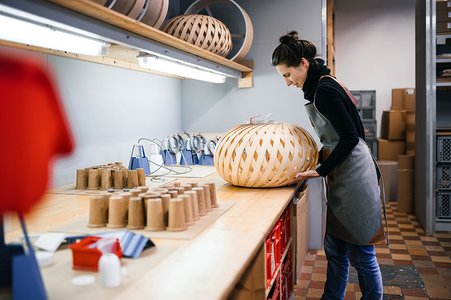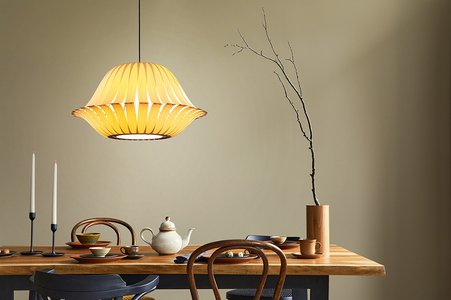![[Translate to English:] Absolvent Alexander Paul Finke im Porträt fotografiert](/fileadmin/HTW/Hochschule/1_Aktuelles/23_Bilder_News/2307_Alex_Finke_Alumni_Portraet.jpg)
Alumni Story: Alexander Paul Finke from the Faculty of Design
Alexander Paul Finke studied product design at HTW Dresden until 2009. He has now been on the market for 13 years with his company dreizehngrad. What challenges and opportunities await today's design students and why a creative degree is always a good idea, the product designer reveals in the current alumni interview.
Finke studied product design at the HTW Dresden until 2009. After graduating, he founded the company "dreizehngrad" together with Jörg Zinser, which develops, manufactures and sells luminaires. Since 2015, the company has been run by Alexander Paul Finke alone. In addition to a fixed range, custom-made products are also offered for project customers. Dresden, located on the 13th degree of longitude, is the company's starting point and headquarters. The luminaires by dreizehngrad are used in private and commercial spaces. In cooperation with architects, interior designers and lighting planners, extraordinary rooms in restaurants, hotels and shops are equipped.
Alex Finke came from Greifswald to study in Dresden in 2005 and has stayed here until today. We asked him which study experiences he remembers gladly, what he took away from his studies and how he has developed professionally since graduating.
You have been on the market with your company since 2010. What is new?
With increasing experience, one's composure increases in many areas; one no longer does many tasks for the first time. In addition, we are now much better organised. I really enjoy product development and am constantly working on new ideas. Most recently, we launched our new luminaire series Disco (2020) and Tango (2023). The presentation of a new product is always a very exciting time.
What memories do you have of your studies at HTWD?
I have fond memories of my studies and still maintain contact with my former university. In addition, students work with me from time to time. I have fond memories of the great freedom during my studies, the family-like atmosphere and the varied offers that allowed us to gain practical experience in projects.
How has the profession of design changed since your studies and what challenges do today's students face?
As the design profession deals with the future, it has always been subject to constant change. Many tools have evolved a lot since I studied, digital tools have become dramatically more powerful, new production techniques have been added, specialisation in different design professions continues to increase. A very hot topic at the moment is the effective use of AI technology. I suppose this has certainly been a topic in the design department for quite a while. I would imagine that the advancing digitalisation sometimes makes it difficult to maintain focus. As a product designer, you work on physical, "tangible" things. So when you develop them, you should also work with your hands in a very classical way.
And why should you study design?
The profession of design is enormously versatile. If you feel a strong will to design within yourself, design can be a good choice. Ideally, you will later work in a job where you are at the forefront of shaping the future. This can sometimes be very demanding, but also often very satisfying.
Is there a special event from your student days that you remember?
At the end of the semester, night shifts had to be worked regularly. The company and support of fellow students, the coffee breaks at 4.00 a.m. and the excitement in the model building workshop nevertheless turned these stress peaks into enjoyable experiences.
What is your favourite place in Dresden?
There are a few: my respective flat, the big garden, the Elbe meadows, Löbtau, the Ostragehege, Neustadt. Now I've been living in Dresden for almost twenty years and I'm always discovering new, beautiful corners.
What career path did you have in mind when you were a student?
There were several options for me, I could have easily imagined working as a salaried designer in an exciting design studio. I only considered the possibility of starting my own business towards the end of my studies. This is certainly partly due to the business start-up course taught by Professor Friedrich.
How well did your studies at HTW Dresden prepare you for professional life?
I felt well prepared at the end of my studies. I think that everyone has to decide for themselves where they want to go and what they have to do to get there.
What professional experience have you gained since graduating?
With self-employment come new challenges to deal with every day. The economic side of the business brought us the most new experiences. Here we also had to pay a lesson in some cases. Besides that, I find the direct contact with customers particularly exciting. It's a very nice experience when your own idea works out.
What tips can you give today's students and prospective graduates?
The sooner you are clear about your goals, the better you can set the right priorities and prepare yourself during your studies. If you don't have a concrete goal yet, then studying offers you the perfect environment to try out as many areas as possible, perhaps even outside the university. In doing so, you almost inevitably come across new opportunities and areas of interest.
Weitere Dokumente/ Antragsformulare finden Sie hier: https://www.htw-dresden.de/en/hochschule/aktuelles/translate-to-english-news



